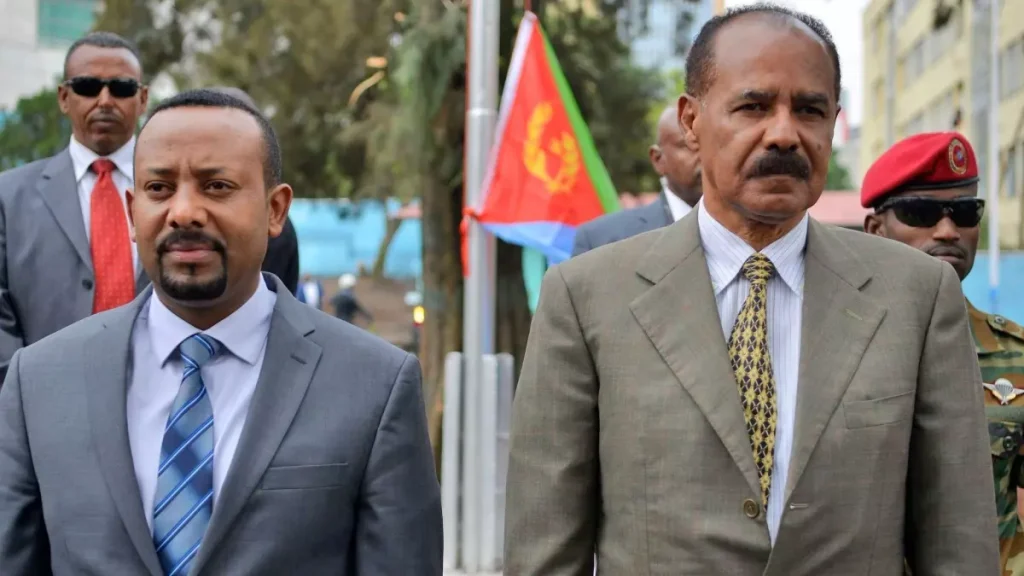Source: Addis Standard
Addis Abeba– Eritrea has accused the Ethiopian government of issuing diplomatic communications to the UN Secretary-General and “several Heads of State and Government” to allege “repeated provocations” and “infringements on Ethiopian sovereign and territorial integrity,” calling the effort part of a broader attempt “to rationalize and ignite conflict.”
In a statement released on 26 June, Eritrea’s Ministry of Information said the Ethiopian government had “ramped up its diplomatic campaigns” in recent days and described the communications as a “transparent ploy” aimed at “hoodwinking the international community” to gather support for what it called “a long-brewing war agenda.”
Eritrea further alleged that the “ruling Prosperity Party has been recklessly indulging, for the last two years, in uncalled-for pronouncements” and “provocative saber-rattling,” which it said was part of efforts to acquire Eritrean ports—“legally if possible and militarily if necessary.”
According to the Eritrean government, these acts have included “a weapons purchasing spree” and “myriad acts of subversion.” Despite what it referred to as “grave threats” to its sovereignty and regional stability, Eritrea said it has shown “maximum restraint.”
It also cited a public statement issued on 16 October 2023, following comments by the Ethiopian Prime Minister to lawmakers that the issue of access to the sea is “an existential matter for Ethiopia,” in which Eritrea said it expressed “dismay” and underlined that it would “not, as ever, be drawn into such alleys and platforms,” urging others “not to be provoked.”
The Ministry rejected what it called “twisting of indelible facts” to repeat accusations of Eritrean aggression, calling the claims “a preposterous lie.”
It also recalled what it described as “the illegal occupation of several Eritrean sovereign lands” by “successive Ethiopian regimes” for nearly two decades, which it said violated “international law, the UN Charter, and the EEBC Award.” Eritrea stated that the occupation was “belatedly rectified” and laid the foundation for the Joint Declaration of Peace and Friendship signed in Asmara on 9 July 2018.
The statement from Eritrea came as an unverified letter, allegedly from Ethiopia’s Ministry of Foreign Affairs and dated 20 June 2025, circulated widely on social media.
The circulating letter accuses the “Eritrean regime” of “repeated provocations against Ethiopia” and “infringements on Ethiopia’s sovereignty and territorial integrity.” It says these actions “constitute a flagrant violation of international law” and “further exacerbate the fragile peace and security situation in the Horn of Africa.”
It also claims Eritrea has adopted “an increasingly hostile posture,” including “territorial occupation,” “violence against civilians,” and “support to various armed groups.” The text calls on the international community to urge Eritrea to “cease and desist its use of proxies in its belligerence against Ethiopia,” while asserting that Ethiopia “continues to stand firm” in its pursuit of “dialogue and peaceful engagement.”
Addis Standard could not independently verify the authenticity of the document.
The diplomatic tensions come weeks after a 24 May speech by Eritrean President Isaias Afwerki, in which he described Ethiopia as caught in a “spiral of crises and devastation” lasting “for eighty years – no less than three generations.” He attributed this to policies “enunciated by Washington’s Fosters” during the Cold War, along with “grave mistakes” made by Soviet leaders. According to him, Ethiopia missed its nation-building moment and instead “gravitated towards ethnic polarization,” which he said led to “upheavals and devastation.”
In response, Ambassador Dina Mufti, former spokesperson for Ethiopia’s Ministry of Foreign Affairs, accused President Isaias of promoting “a very dangerous” narrative of “Cushitic-Semitic antagonism” as part of an alleged strategy to “realign forces in the Horn.” Dina said Isaias aimed to unite “ethnic militias from the Tigray and Amhara region” under a coalition to overturn the federal government, which he claimed Isaias views as “subservient to external forces.”







